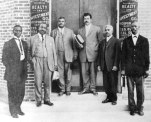|
|
 |
 |
|
Reading Guide |
| 1. |
1913: Fifty Years
| - | James Weldon Johnson, "Fifty Years, 1863-1913," poem, 1913 |
| - | Booker T. Washington, "Negro Progress in Virginia," address, 1913 |
| - | Lucious Curtis, "Times Is Gettin' Harder," blues, as performed in 1940 |
|
|
 |
1913 marked the 50th anniversary of the Emancipation Proclamation, and celebrations were held across the nation to herald the event. Philadelphia hosted a special Proclamation exhibition, and Meta Warrick-Fuller sculpted an emancipation monument that still stands in Harriet Tubman Park in Boston. In addition to revelry was soul-searching. Was the promise of the Proclamation alive and well? What had one done to foster equality, tolerance, and economic opportunity? James Weldon Johnson wrote the poem "Fifty Years," published in the New York Times on January 1, 1913, in which he championed hope despite the nation's failure to honor its black citizens as equals. Later in the year, Booker T. Washington delivered an address in Virginia applauding its black organizations and white supporters on the "Negro progress" they had achieved in the more mundane yet critical aspects of living free (and poor) in the South. 1913 also marked the inauguration of Woodrow Wilson, whose seemingly progressive views on race encouraged black Americans, at least for a while.
For most African Americans in 1913, however, life was hard, plain hard, with few gains to savor from the fifty years of freedom. So it is important that we include the blues song "Times Is Getting' Harder" as we begin the period of 1907 to 1917, tumultuous years of "race war," the U.S. entry into the Great War, and the Great Migration north. 10 pages.
Discussion questions
- How does Johnson signal the Proclamation anniversary as an American celebration as much as an African American celebration?
- How does he encourage pride, and how does acknowledge despair? Where does hope lie for the next fifty years?
- Compare the lives of black Virginians in 1913 with those of the newly emancipated blacks in 1865. What is most significant factor, in your opinion, from the perspective of the 21st century?
- To what factors does Washington ascribe the progress of black Virginians? How might Du Bois or James Weldon Johnson view Washington's appraisal? What about Lucious Curtis?
|
» Link |
 |
 |
Topic Framing Questions
| • |
What gains and setbacks mark the period of 1907 to 1917 for black Americans? |
| • |
To what extent did African Americans set their own paths forward? |
| • |
How were the lives of ordinary black people affected by black and white leadership? |
| • |
What identity had African Americans created, as a group, between 1865 and 1917? |
| • |
What insights could black Americans take forward into the postwar years and the 1920s?
|
|
|
 |
 |
|
 |
